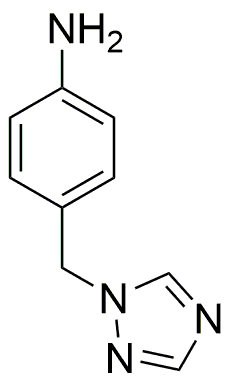4-(1,2,4-Triazol-1-ylmethyl)aniline is widely utilized in research focused on:
- Pharmaceutical Development: This compound serves as a key intermediate in the synthesis of various pharmaceuticals, particularly in the development of antifungal and antibacterial agents, enhancing the efficacy of treatments.
- Agricultural Chemicals: It is used in formulating agrochemicals, including fungicides and herbicides, providing effective solutions for pest management in crops, thus supporting agricultural productivity.
- Material Science: The compound is explored in the creation of advanced materials, such as polymers and coatings, which can offer improved durability and resistance to environmental factors.
- Biochemical Research: Researchers utilize it as a biochemical probe to study enzyme interactions and metabolic pathways, facilitating advancements in understanding biological processes.
- Analytical Chemistry: It is employed in analytical methods for detecting and quantifying substances in various samples, ensuring quality control in pharmaceuticals and environmental monitoring.
General Information
Properties
Safety and Regulations
Applications
4-(1,2,4-Triazol-1-ylmethyl)aniline is widely utilized in research focused on:
- Pharmaceutical Development: This compound serves as a key intermediate in the synthesis of various pharmaceuticals, particularly in the development of antifungal and antibacterial agents, enhancing the efficacy of treatments.
- Agricultural Chemicals: It is used in formulating agrochemicals, including fungicides and herbicides, providing effective solutions for pest management in crops, thus supporting agricultural productivity.
- Material Science: The compound is explored in the creation of advanced materials, such as polymers and coatings, which can offer improved durability and resistance to environmental factors.
- Biochemical Research: Researchers utilize it as a biochemical probe to study enzyme interactions and metabolic pathways, facilitating advancements in understanding biological processes.
- Analytical Chemistry: It is employed in analytical methods for detecting and quantifying substances in various samples, ensuring quality control in pharmaceuticals and environmental monitoring.
Documents
Safety Data Sheets (SDS)
The SDS provides comprehensive safety information on handling, storage, and disposal of the product.
Product Specification (PS)
The PS provides a comprehensive breakdown of the product’s properties, including chemical composition, physical state, purity, and storage requirements. It also details acceptable quality ranges and the product's intended applications.
Certificates of Analysis (COA)
Search for Certificates of Analysis (COA) by entering the products Lot Number. Lot and Batch Numbers can be found on a product’s label following the words ‘Lot’ or ‘Batch’.
*Catalog Number
*Lot Number
Certificates Of Origin (COO)
This COO confirms the country where the product was manufactured, and also details the materials and components used in it and whether it is derived from natural, synthetic, or other specific sources. This certificate may be required for customs, trade, and regulatory compliance.
*Catalog Number
*Lot Number
Safety Data Sheets (SDS)
The SDS provides comprehensive safety information on handling, storage, and disposal of the product.
DownloadProduct Specification (PS)
The PS provides a comprehensive breakdown of the product’s properties, including chemical composition, physical state, purity, and storage requirements. It also details acceptable quality ranges and the product's intended applications.
DownloadCertificates of Analysis (COA)
Search for Certificates of Analysis (COA) by entering the products Lot Number. Lot and Batch Numbers can be found on a product’s label following the words ‘Lot’ or ‘Batch’.
*Catalog Number
*Lot Number
Certificates Of Origin (COO)
This COO confirms the country where the product was manufactured, and also details the materials and components used in it and whether it is derived from natural, synthetic, or other specific sources. This certificate may be required for customs, trade, and regulatory compliance.


